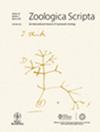Insights into the evolutionary history of Diestramimini cave crickets (Orthoptera, Rhaphidophoridae)
IF 2
2区 生物学
Q2 EVOLUTIONARY BIOLOGY
引用次数: 0
Abstract
Diestramimini is one of the two tribes of Aemodogryllinae and is mainly distributed in southern China and Southeast Asia. The intergeneric phylogenetic relationship and historical biogeography of this tribe remain unclear. Here, we present the first phylogenetic and biogeographical analyses of Diestramimini based on three mitochondrial (COI, 12S rRNA and 16S rRNA) and two nuclear (18S rRNA and 28S rRNA) gene fragments. The molecular phylogenetic inference strongly supports the monophyly of Diestramimini and recovers the sister‐group relationship between Diestramima + Tamdaotettix and Arboramima + Gigantettix. A new genus, Bidiestramima Zhu & Shi gen. n., is established and recovered as sister to all the remaining genera of Diestramimini. Moreover, a new species Bidiestramima hekouensis Zhu & Shi gen. et sp. n. is described. Mimadiestra is recovered as paraphyletic, and thus, we propose two new combinations based on the combination of morphological and molecular evidence: Bidiestramima dicha comb. n. and Tamdaotettix (Laotettix) gracilus comb. n. Divergence time estimation and reconstruction of ancestral areas indicate that Diestramimini in China may have originated from Southern Yunnan and Guangxi during the mid‐Oligocene and had two separate evolutionary routes. The diversification of Diestramimini has been driven by several dispersal and vicariance events since the Miocene, linked to the uplift of the Himalaya–Tibetan Plateau, the formation of the monsoon and climate fluctuations.洞蟋蟀进化史研究(直翅目,鼠夜蛾科)
Diestraimini是Aemodogryllinae的两个部落之一,主要分布在中国南部和东南亚。该部落的属间系统发育关系和历史生物地理学尚不清楚。在这里,我们首次基于三个线粒体(COI、12S rRNA和16S rRNA)和两个细胞核(18S rNA和28S rNA)基因片段对双链亚胺进行了系统发育和生物地理学分析。分子系统发育推断有力地支持双曲胺的单系性,并恢复了双曲胺之间的姐妹群关系 + Tamdaotettix和Arboramima + Gigantettix。建立并恢复了一个新属,Bidiestramima Zhu&Shi gen.n,作为Diestramimini所有剩余属的姊妹属。此外,还报道了一个新种——河口毕氏虫。Mimadestra被恢复为副系,因此,我们基于形态学和分子证据的组合提出了两种新的组合:Bidiestramima dicha梳。n.和Tamdaotettix(Laotettix)gracilus梳。n.分化时间的估计和祖先区域的重建表明,中国的Diestraimini可能起源于渐新世中期的滇南和广西,并有两条独立的进化路线。Diestraimini的多样化是由中新世以来的几次分散和替代事件驱动的,这些事件与喜马拉雅-青藏高原的抬升、季风的形成和气候波动有关。
本文章由计算机程序翻译,如有差异,请以英文原文为准。
求助全文
约1分钟内获得全文
求助全文
来源期刊

Zoologica Scripta
生物-动物学
CiteScore
5.60
自引率
0.00%
发文量
52
审稿时长
>12 weeks
期刊介绍:
Zoologica Scripta publishes papers in animal systematics and phylogeny, i.e. studies of evolutionary relationships among taxa, and the origin and evolution of biological diversity. Papers can also deal with ecological interactions and geographic distributions (phylogeography) if the results are placed in a wider phylogenetic/systematic/evolutionary context. Zoologica Scripta encourages papers on the development of methods for all aspects of phylogenetic inference and biological nomenclature/classification.
Articles published in Zoologica Scripta must be original and present either theoretical or empirical studies of interest to a broad audience in systematics and phylogeny. Purely taxonomic papers, like species descriptions without being placed in a wider systematic/phylogenetic context, will not be considered.
 求助内容:
求助内容: 应助结果提醒方式:
应助结果提醒方式:


